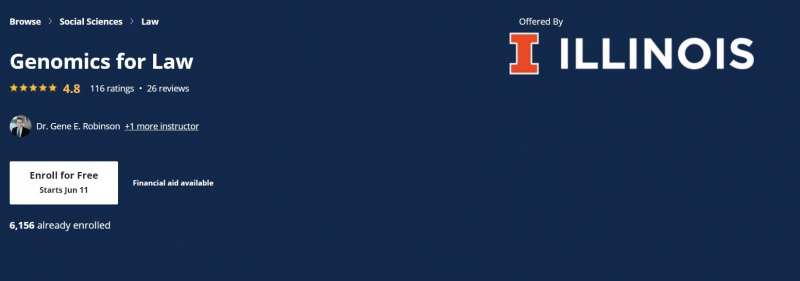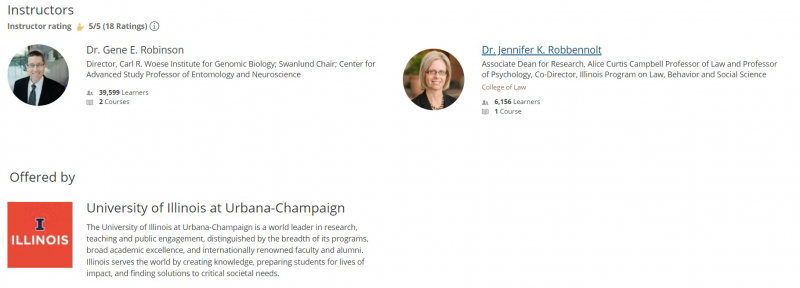Genomics for Law

Genomes for Law presents a one-of-a-kind framework for reviewing the history and fundamentals of genomics research as well as investigating how genomics has and will continue to interact with the law. Throughout this course, you will investigate the legal implications of genomics research as well as the legal influences and consequences of genomics research as they relate to the following topics:
- Genomics and Criminal Law
- Genomics and Criminal Procedure
- Forensic Genomics
- Intellectual Property Protection and Biotechnology
- Genomics and Tort Law.
- Genomics and Privacy Law:
- Legal and Ethical Issues in Genomics
This course can be taken to fulfill continuing legal education (CLE) credits for practicing lawyers. 9 MCLE hours have been approved in Illinois. In this course, you will review what genomics is and discuss the relationship of genomics to the law. You will review the basic structure and function of the genome, the vocabulary used to describe its components, and understand how technology has and will continue to influence genomics, as well as how genomics is used in a variety of fields, including healthcare, food security, energy, and law. You will discuss the relationship of genomics to criminal law; how genetic evidence and genomic defenses currently operate in the criminal justice system; and explore how fully allowing genetic evidence and genomic defenses might improve or harm criminal law.
You will understand how criminal law might or might not recognize genomics as a defense, review types of changes needed in criminal law to accommodate genetic evidence, and examine how changes in criminal law, to accommodate genetic evidence and defenses, could impact criminal law. You will explore how private individuals' genomes are in a criminal law context, how DNA is examined and processed in criminal investigations, and examine under what circumstances individuals' genomes are protected from access by the government in a criminal law context. You will also recognize under which circumstances the government has an interest in individuals' genomes in a criminal law context and review the basics of the CODIS STRs (Combined DNA Indexing System). You will also review the history, economics, and legal reasoning behind intellectual property protection. You will then examine the basic requirements to obtain a patent and identify which types of biological materials or processes are patent eligible using current case law. Additionally, comparative intellectual property legal regimes will be introduced. This is one of the best online genetics courses.
This course offers
- Flexible deadlines
- Shareable Certificate
- 100% online
- Beginner Level
- It takes approximately 12 hours to complete.
- Subtitles: French, Portuguese (European), Russian, English, Spanish
Coursera rating: 4.8/5
Enroll here: https://www.coursera.org/learn/genomics-for-law










